UWE Bristol among first organisations to sign agreement to reduce environmental impacts of conducting research

UWE Bristol is among the first organisations to commit to a new national voluntary agreement to progressively embed environmental sustainability into all research and innovation practices.
The University is one of 15 signatories to a concordat aimed at creating a meaningful and long-lasting impact in reducing the environmental effects of carrying out research.
The Concordat for the Environmental Sustainability of Research and Innovation Practice supports the wider ambition set out by the UK Government to achieve net zero by 2050. The initial group of 15 signatories – which include universities, a charity and major research funding bodies – are calling on other organisations to join.
Georgina Gough, Professor in Education for Sustainable Development at UWE Bristol, said: “UWE Bristol is proud to be one of the founding signatories of the Concordat for the Environmental Sustainability of Research and Innovation Practice.
“The Concordat recognises that research and innovation is key to both understanding the that impact climate change and biodiversity loss are having on our planet and how to solve these challenges, but also that research and innovation must be conducted in the most environmentally sustainable way possible.
“UWE Bristol has long standing engagement with priority agendas underpinning the concordat, including the UN Sustainable Development Goals, Equality, Diversity, and Inclusion, Health and Safety, Modern Slavery and Research Ethics and Integrity. We look forward to using our engagement with the concordat to reflect on the extent to which these actions inform and guide our research activity.
“We particularly look forward to working collaboratively and sharing experiences and good practice, both within our institution and with external stakeholders, to achieve continuous improvement in the environmentally sustainable practice of research and innovation, in the UK and globally.”
Signatories to the concordat agree to action six priority areas, such as maintaining transparency about the environmental impacts of research output and finding new climate-conscious, low-carbon approaches. There is also an expected commitment from signatories to publicly share how their organisations will deliver its sustainability aims and publish annual summaries of progress.
Iain Foulkes, Executive Director of Research and Innovation at Cancer Research UK, another initial signatory of the concordat, said: “We have a key part to play in reducing the environmental impact of our research by addressing how the labs and facilities we fund operate, enabling researchers to carry out their activities in a sustainable manner. The concordat will allow us to work together to build a more sustainable research system.”
The concordat represents a shared ambition for the UK to continue delivering cutting-edge research but in a more environmentally responsible way. It also recognises the critical role of research and innovation to understand how our planet is changing, and creating solutions to the challenges we face.
Organisations from across the UK research and innovation sector have worked together, involving extensive consultation, to develop the set of priorities and responsible behaviours set out in the concordat. The final document is owned collectively by the UK research and innovation sector.
The Wellcome Trust is hosting the concordat on its website providing information on how to join, alongside a regularly maintained list of signatories and supporters.
Related news

15 December 2025
UWE Bristol rises eleven places in People & Planet University League
UWE Bristol has risen to 14th in the People & Planet University League (UK), a jump of eleven places.

12 December 2025
UWE Bristol’s environmentally conscious and student-focused accommodation wins three awards
Purdown View, the world's largest certified Passivhaus student accommodation development, has been recognised at Property Week Student Accommodation Awards.

20 November 2025
UWE Bristol ranked among top 12 per cent of universities globally for sustainability
UWE Bristol has climbed over 400 places in the QS World University Sustainability Rankings 2026, which evaluates universities on a range of environmental and social impacts.

06 November 2025
UWE Bristol welcomes West of England Mayor for annual Green Week
Helen Godwin, Mayor of the West of England, visited UWE Bristol during its annual Green Week to see the sustainability-driven research, innovation and skills initiatives that are helping to power the growth of the region’s green economy.
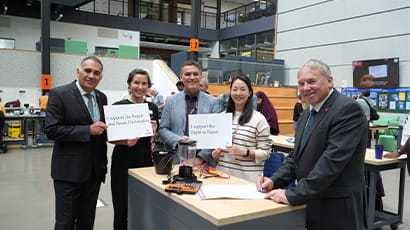
16 October 2025
UWE Bristol signs Repair and Reuse Declaration in commitment to sustainable initiatives
UWE Bristol is the first UK university to sign the Repair and Reuse Declaration as a whole institution, a call to legislators and decision makers to tackle climate change through greater repair and reuse support.

15 October 2025
UK food needs radical transformation on scale not seen since Second World War, new report finds
A new report from the Agri-Food for Net Zero Network+ finds urgent action on food is needed if the UK is to reboot its flagging economy, save the NHS billions, ensure national food security, and meet climate commitments.
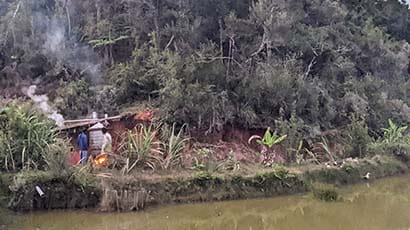
24 September 2025
UWE Bristol to help protect threatened forest in Madagascar in £800k project
UWE Bristol is a partner in a groundbreaking project awarded almost £800,000 in funding to protect one of Madagascar’s most precious and threatened forests.
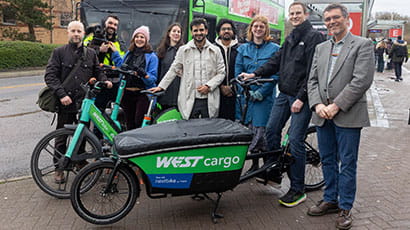
24 February 2025
WESTbusStop+ makes sustainable travel more convenient
A new WESTbusStop+ bringing together buses and other ways to travel has been officially opened at UWE Bristol’s Frenchay campus.
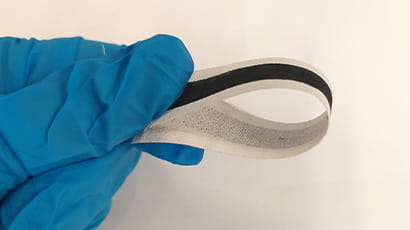
03 January 2025
Big leap forward for environmentally friendly ‘e-textiles’ technology
Research led by UWE Bristol and the University of Southampton has shown wearable electronic textiles (e-textiles) can be both sustainable and biodegradable.

28 November 2024
Work of UWE Bristol academics features in Government report on air quality measurement
Two UWE Bristol academics have made contributions to an influential Government report on the measurement of air pollution.

27 November 2024
Traffic noise reduces the stress-relieving benefits of listening to nature, study finds
Road traffic noise reduces the wellbeing benefits associated with spending time listening to nature, researchers have discovered.

15 November 2024
Grasslands project led by UWE Bristol academic to support UK’s bid for net zero emissions
A UWE Bristol researcher will lead a £4.7 million project focused on the management of UK’s grasslands aimed at supporting efforts to achieve net zero emissions by 2050.
You may also be interested in

Media enquiries
Enquiries related to news releases and press and contacts for the media team.
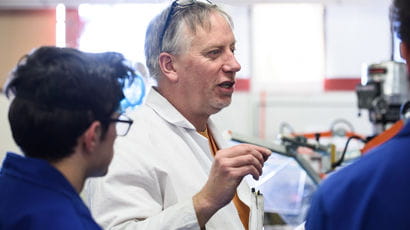
Find an expert
Media contacts are invited to check out the vast range of subjects where UWE Bristol can offer up expert commentary.

Sustainability at UWE Bristol
Sustainability is embedded in our culture, research and teaching. We have already invested heavily in campus improvements and new technology, with plans underway to be carbon neutral by 2030.






